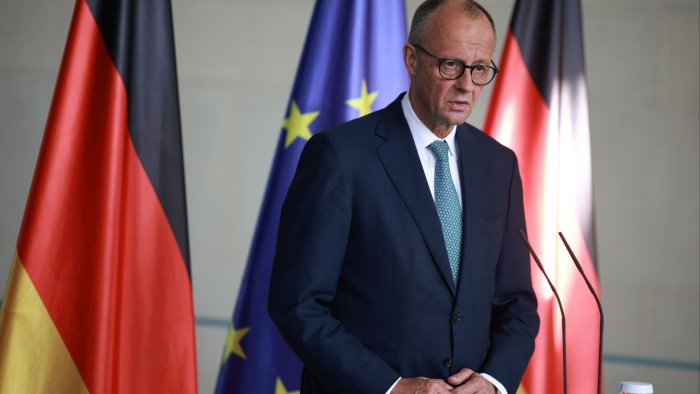Share this @internewscast.com
Unlock the Editor’s Digest for free
Germany and France expressed criticism of the eagerly anticipated EU-US trade agreement on Monday, cautioning that it could harm the bloc’s economic interests, leading to a decline in the euro against the dollar.
German Chancellor Friedrich Merz stated that the pact, reached with US President Donald Trump the previous day, would inflict “considerable damage” to Germany, Europe, and ultimately the US itself.
Merz further explained, “Not only will it result in higher inflation rates, but it will also adversely impact transatlantic trade as a whole,” providing a stark critique of the deal brokered by European Commission President Ursula von der Leyen.
The euro was down more than 1 per cent against the dollar and weakened by 0.7 per cent against the pound following the announcement on Sunday that the US would impose 15 per cent tariffs on most imports from the EU.
“This result cannot satisfy us,” Merz added. “But it was the best result achievable in a given situation.”
France’s Prime Minister François Bayrou said the deal marked a “dark day”, adding that the EU had “resigned itself into submission”.
Sunday’s agreement, hailed by von der Leyen as “the biggest trade deal ever” and covering nearly 44 per cent of global GDP, averted a possible transatlantic trade war.
The deal secured a lower tariff rate for the EU than the 30 per cent the US president had threatened to impose from August 1.
However, the duties still mark a threefold increase from the average tariffs imposed on the bloc by the US before Trump’s “liberation day” announcements in April.
European stocks relinquished earlier gains as the initial relief that a deal had been struck was replaced by concern over its impact on the Eurozone economy.
Germany’s Dax closed 1 per cent lower while France’s Cac 40 gave up 0.4 per cent. Tariff-exposed car industry stocks on the region-wide Stoxx Europe 600 fell 1.8 per cent, having risen by a similar amount at the opening of trade on Monday.
The euro remains 12 per cent higher against the dollar for the year, boosted by Germany’s defence spending plans as well as broader investor hopes that Trump’s America First policies will encourage a wave of economic stimulus in the Eurozone.
The industry body for EU steel producers said a 15 per cent American tariff on most imports from the bloc would add a “huge burden” on its members.
The US Chamber of Commerce in the EU welcomed the deal, saying that it “provides relief” to businesses.
But it added that the 15 per cent tariff rate “still marks a significant increase in the cost of trading” and that more sectors should be included in the agreement’s zero-for-zero tariff list.
The White House said the deal “achieves historic structural reforms and strategic commitments that will benefit American industry, workers, and national security for generations”.
As Europe’s leaders reacted to the agreement, Spain’s Prime Minister Pedro Sánchez said he supported it “but without any enthusiasm”.
Far-right parties in France and Germany argued that the deal exposed the weakness of the bloc.
Alice Weidel, co-leader of Germany’s Alternative for Germany party, posted on X that it was “not an agreement, but a slap in the face to European consumers and producers!”
The reaction to the deal came as Trump and UK Prime Minister Sir Keir Starmer met at the US president’s Turnberry golf course in Scotland to discuss Britains’s own trade agreement with the US, as well as the wars in Ukraine and Gaza.
Speaking in Scotland on Monday, Trump said he planned to set a tariff rate of up to 20 per cent “for essentially the rest of the world”, referring to countries that do not strike specific trade agreements with the US.
He added that he planned to announce pharmaceutical tariffs “in the near future”.
Reporting by Aime Williams in Washington, Alice Hancock in Brussels, Anne-Sylvaine Chassany in Berlin, Simeon Kerr in Turnberry, Ian Smith and Emily Herbert in London and Leila Abboud in Paris









